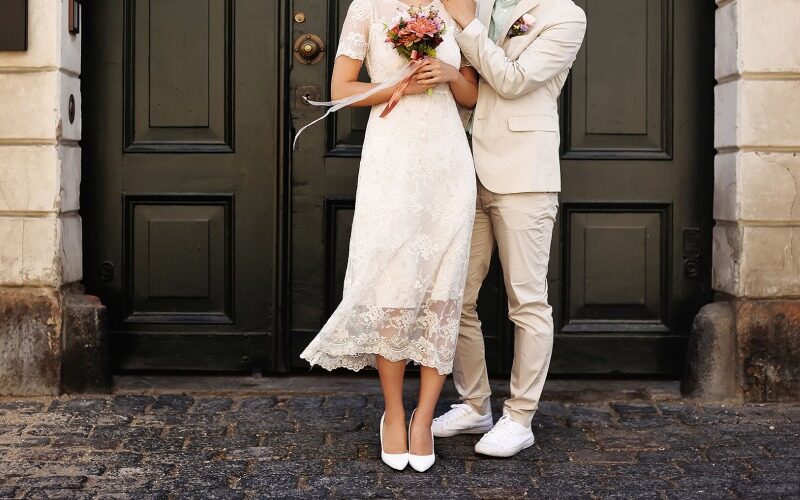How To Plan A Civil Wedding Ceremony - 10 FAQs

People have a lot of questions about civil weddings because they can be somewhat different from traditional weddings, which are frequently more well-known and familiar to people. Also, civil weddings may have different requirements and procedures based on the location and the local rules governing marriage, which could cause additional confusion.
It’s not just for engaged couples who are thinking about having a civil ceremony that have questions. Wedding guests and families who are invited to a civil ceremony typically have common questions such as appropriate attire and the ceremony program. So, we thought it would be helpful to compile a list of some of the most frequently asked questions regarding civil wedding ceremonies. We really hope that this give you a head start on your civil wedding ceremony planning!
What happens at the civil wedding ceremony in the courthouse?
This is one of the most asked questions! The exact process of a civil wedding ceremony can vary depending on the location and the preferences of the couple, but here is a general outline of what a short and simple civil wedding ceremony might entail:
- Introduction: The officiant will welcome the guests and introduce the couple.
- Declaration of intent: The officiant will ask the couple to declare their intent to marry.
- Exchange of vows: The couple will exchange their vows, either written by themselves or provided by the officiant.
- Exchange of rings: The couple may choose to exchange rings as a symbol of their commitment.
- Pronouncement of marriage: The officiant will pronounce the couple as married.
- Signing of the marriage certificate: The couple and witnesses will sign the marriage certificate to make the marriage legal.
- Closing remarks: The officiant will offer any closing remarks and congratulate the couple.
The entire ceremony can be very short and simple, taking only a few minutes to complete. However, some couples may choose to add readings, music, or other elements to make the ceremony more personalized and meaningful. Get in touch with the relevant departments of your local government and the registry to learn the specific steps involved in the wedding ceremonies as well as the things that can be incorporated to tailor the experience to your preferences and requirements. Ultimately, the important thing is that the couple is able to express their love and commitment to each other in a way that is meaningful to them.
Civil Wedding Ceremony - FAQs
Q1: Who marries people in a civil ceremony?
A: In a civil ceremony, the couple is typically married by a government official or a civil registrar who is authorized by law to perform marriages. This may vary depending on the country or state/province in which the ceremony is taking place.
In some countries, such as the United States, a judge or justice of the peace may perform civil ceremonies. In other countries, such as the United Kingdom, a registrar or superintendent registrar may perform the ceremony. In some countries, a civil marriage can also be performed by a mayor or a designated government official.
Regardless of who performs the ceremony, the main purpose of a civil ceremony is to legally bind the marriage in accordance with the laws of the jurisdiction where the ceremony is taking place.
Q2: Do you exchange rings at a civil ceremony?
A: Yes, it’s common to exchange rings during a civil wedding ceremony. The exchange of rings is a symbolic gesture that represents the couple’s commitment to each other and their love for one another.
During the ceremony, the couple typically exchange rings and repeat vows to each other. The exchange of rings can occur after the vows are spoken or at any point during the ceremony that the couple chooses. Some couples choose to have the rings presented to them by a family member or friend, while others exchange rings directly with each other.
It’s worth noting that the exchange of rings is not a legal requirement for a civil ceremony, but it is a common tradition that many couples choose to include as part of their wedding celebration.
Q3: Do civil weddings need vows?
A: Civil weddings typically involve the exchange of vows between the couple. Vows are a meaningful and personal way for the couple to express their commitment to each other and their love for one another.
In a civil ceremony, the couple may choose to recite traditional wedding vows or they may choose to write their own personalized vows. The vows can be as short or as long as the couple desires, and can be tailored to fit their individual beliefs and values.
The exchange of vows is an important part of the wedding ceremony and is considered a legal requirement in many jurisdictions. It’s worth noting that the specific requirements for vows may vary depending on the country or state/province in which the ceremony is taking place, so it’s important to check with the local government offices or registry to determine any specific requirements for your civil wedding ceremony.
Q4: How many witnesses are needed for a civil wedding?
A: The number of witnesses needed for a civil wedding ceremony can vary depending on the requirements of the jurisdiction where the wedding is taking place. In most cases, at least two witnesses are required to sign the marriage license or certificate in order for the marriage to be legally recognized.
These witnesses are typically present during the ceremony and are responsible for signing the marriage license or certificate immediately after the couple has exchanged vows and rings. They must be of legal age and not be closely related to either member of the couple.
In some cases, the officiant or government official conducting the ceremony may provide witnesses, but in most cases, the couple is responsible for bringing their own witnesses to the ceremony.
It’s important for the couple to check with their local jurisdiction to determine the specific requirements for witnesses for a civil wedding ceremony, as these requirements can vary from place to place.
Q5: How fast is the entire process of a civil wedding?
A: The duration of a civil wedding ceremony can vary depending on a variety of factors, including the complexity of the ceremony, the number of guests, and the preferences of the couple. In general, a civil wedding ceremony can range from a few minutes to up to an hour, depending on the circumstances.
The actual civil wedding ceremony itself, including the exchange of vows and rings, typically takes only a few minutes to complete. However, the entire process of getting married in a civil ceremony may take longer, as there may be administrative tasks such as signing the marriage license and completing any necessary paperwork.
In some jurisdictions, couples may choose to have a shorter or simpler civil ceremony, known as a “registry office wedding”, which is designed to be a quick and efficient way to get married. These ceremonies may take as little as 15 minutes to complete, and typically involve only the exchange of vows and signing of the marriage certificate.
Ultimately, the duration of a civil wedding ceremony will depend on the specific circumstances of the wedding and the preferences of the couple.
Q6: How long does a civil wedding ceremony last?
A: The length of a civil wedding ceremony can vary depending on a number of factors such as the number of guests, the specific requirements of the jurisdiction, and the preferences of the couple.
In general, a civil wedding ceremony typically lasts between 15 and 30 minutes, but it can be shorter or longer depending on the circumstances.
The actual exchange of vows and rings usually only takes a few minutes, but additional time may be required for the signing of legal documents and any other administrative tasks that are necessary to make the marriage official.
It’s important to note that the duration of a civil wedding ceremony can also be affected by other factors such as any readings, music, or other elements that the couple has chosen to include in the ceremony. Ultimately, the length of the ceremony will depend on the specific circumstances and preferences of the couple.
Q7: Is there a maid of honor in a civil wedding?
A: There is no requirement for a maid of honor or any other specific attendants in a civil wedding. However, couples can choose to have a maid of honor or other attendants if they wish to do so.
In a civil wedding, the couple has more flexibility in choosing the format and structure of the ceremony, as there are no specific religious or cultural traditions that need to be followed. This means that the couple can customize the ceremony to fit their individual preferences and needs.
If the couple chooses to have attendants, they can assign roles such as maid of honor, best man, bridesmaids, groomsmen, and other supporting roles. These individuals can help with tasks such as organizing the wedding, providing emotional support, and standing by the couple during the ceremony.
Ultimately, the decision to have attendants or not is up to the couple and their personal preferences for their civil wedding ceremony.
Q8: What should a bride wear to a civil wedding?
A: There are no strict rules or guidelines for what a bride should wear to a civil wedding, as the choice of attire will ultimately depend on the individual’s preferences and the overall style of the wedding. However, here are some general suggestions that may be helpful:
- Dress: A bride can wear a traditional wedding dress, a modern wedding dress, or a dress that is more casual and informal. The dress can be any color or style that the bride feels comfortable and confident in.
- Suit: If the bride prefers a more masculine or gender-neutral look, they can opt to wear a suit instead of a dress. A well-tailored suit can be a stylish and sophisticated choice for a civil wedding.
- Accessories: The bride can accessorize their outfit with jewelry, shoes, and other accessories that complement their chosen attire. They may also choose to wear a veil, headpiece, or other decorative accessories.
- Comfort: It’s important to consider the location and time of day of the wedding when choosing an outfit. The bride should choose an outfit that is comfortable and appropriate for the weather and setting.
Ultimately, the most important thing is for the bride to choose an outfit that makes them feel confident, comfortable, and happy on their special day.
Q9: How many guests can you invite to a civil wedding?
A: The number of guests that are allowed to attend a civil wedding may vary depending on the specific courthouse or venue where the wedding is taking place. In general, civil weddings tend to be smaller and more intimate affairs, with fewer guests than traditional weddings.
The capacity of the venue may also affect the number of guests allowed, as some courthouses or other venues may have restrictions on the number of people who can be accommodated.
It is recommended to check with the courthouse or venue where the wedding is taking place to determine their policies and restrictions on the number of guests that can attend. Additionally, the couple getting married may have their own preferences on the size of their wedding, so it’s important to consider their desires when determining the guest list.
Q10: Are taking professional photos allowed during the ceremony inside the courtroom?
A: The rules and regulations for taking professional photographs during a civil wedding inside a courtroom may vary depending on the specific courthouse and the jurisdiction. It is best to check with the courthouse or the judge’s office to confirm their policies on photography during civil weddings.
In general, most courthouses and judges allow photography during civil weddings, but there may be some restrictions on the use of flash photography or the placement of cameras. Some courthouses may also require photographers to obtain a permit or pay a fee to take photographs.
It is important to respect the rules and guidelines of the courthouse or judge’s office when taking photographs during a civil wedding. The couple getting married may also have their own preferences and restrictions on photography, so it is important to discuss any photography plans with them ahead of time.

















